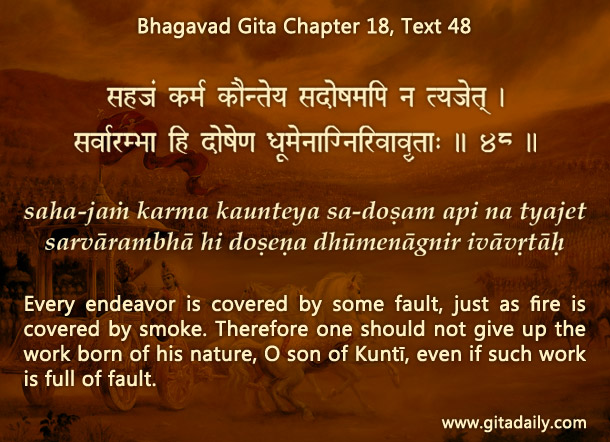Suppose schools started teaching kids, “The world is such a terrible place that you can’t even survive unless you learn to lie.” When parents express concern about such teachings, the school authorities respond, “We are just being realistic instead of being idealistic.” Would their approach be justified?
To understand, let’s consider how Bhagavad-gita provides education. It realistically acknowledges that faults cover our endeavors just as smoke covers fire (18.48). The smoke refers to morally objectionable actions, and the fire to the greater good that we can further by persevering in our duties, even when circumstances sometimes constrain us to make moral choices that we aren’t proud of.
Significantly however, the Gita precedes this realistic acknowledgement with seventeen chapters that describe a reality rich with potential. It states that we are essentially spiritual; we can manifest great virtue and vigor, which can empower us to become better and help make the world better. To manifest our potential, we need to strive diligently according to time-tested wisdom-texts (03.30). When we strive thus, God himself assists us from within our hearts (10.10)
Seen in this light, what does the Gita’s smoke-fire metaphor imply? Not that we nonchalantly add further smoke to the fire, but that we don’t let the smoke of morally questionable actions stop us from pursuing the fire of the greater good
Education is meant to first provide an inspiring vision of how things can be at their best and how we have the opportunity and responsibility to assist by striving to be our best. When we live inspired by that vision, we will make moral adjustments only when they are unavoidable, not whenever they are expedient.
One-sentence summary:
Education is meant to be first idealistic — explaining how things can and should be — and later realistic, explaining how things are.
Think it over:
- How is the Gita’s educational approach idealistic?
- How is the Gita’s educational approach realistic?
- When you educate others, how do you balance the idealistic and realistic approaches?
***
18.48: Every endeavor is covered by some fault, just as fire is covered by smoke. Therefore one should not give up the work born of his nature, O son of Kunti, even if such work is full of fault.


Leave A Comment